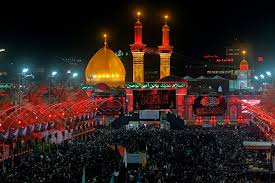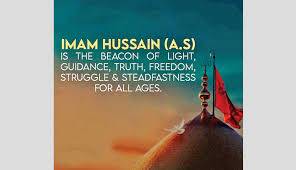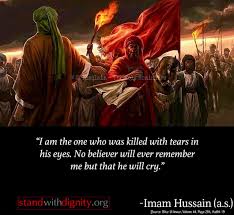
October 10, 680 AD (10th of Muharram, 61 AH) saw the Battle of Karbala, which is seen as a pivotal episode in Islamic history and a powerful representation of bravery, selflessness, and justice. This sad yet inspirational incident happened in modern-day Iraq, where Imam Husayn ibn Ali, the Prophet Muhammad’s grandson, and his family and friends persevered in the face of insurmountable difficulties. Choosing martyrdom over surrender to oppression, Imam Husayn stood by his ideals in the face of overwhelming odds and inevitable death. In addition to being a historical battle, the Battle of Karbala is also a poignant story that has endured for centuries, highlighting the significance of upholding justice even in the face of extreme hardship.
Imam Husayn stood by his ideals in the face of overwhelming odds and inevitable death. In addition to being a historical battle, the Battle of Karbala is also a poignant story that has endured for centuries, highlighting the significance of upholding justice even in the face of extreme hardship.
The Historical Context

The Context of History
Examining the political environment of the period is crucial to comprehending the significance of the Battle of Karbala. Following the Prophet Muhammad’s demise in 632 AD, the Muslim community was led by a succession of caliphs. Eventually, the Umayyad dynasty under the leadership of Muawiya I came to power; following his passing, his son Yazid became caliph. Yazid’s reign was characterised by tyranny, political corruption, and a contempt for Islam’s moral precepts. Being a direct descendant of the Prophet Muhammad, Imam Husayn declined to swear loyalty to Yazid because he understood the moral decline his leadership represented.
Not only was Imam Husayn’s rejection of Yazid a political move, but it was also a protest against the perversion of the Islamic principles that his grandfather, Prophet Muhammad, had established. Imam Husayn aimed to uphold the core principles of morality, fairness, and righteousness that Islam represented. He believed that supporting a despotic leader such as Yazid would have been tantamount to condoning oppression and tyranny.
The Battle and Its Aftermath

The Conflict and Its Repercussions
After travelling from Medina to Karbala with seventy-two of his family members and followers, Yazid’s army caught up with them. Thousands of Yazid-loyal soldiers approached Husayn’s camp, which contained women and children. Husayn and his supporters refused to give in to injustice even though they were vastly outnumbered. For several days, they were without water and had to contend with not just a sizable force but also the devastation caused by hunger and thirst.

During the pivotal combat day of Muharram 10, Imam Husayn and his small group of supporters battled bravely. They battled one by one, sticking to their convictions and upholding the truth. It reached its peak when Imam Husayn, the final survivor, wasBut Yazid’s efforts had the opposite consequence of silencing opposition. The horrific murder of Husayn and his family sparked outrage across the Muslim world. Husayn’s martyrdom eventually served as a call to justice, signifying the never-ending conflict between tyranny and righteousness. His passing did not bring an end to his cause; rather, it planted the seeds of resistance to injustice, which sparked uprisings and movements throughout the history of Islam.
Legacy and Lessons
Beyond its religious significance, the lessons of Karbala are universal. A timeless lesson that moral integrity should never be compromised, especially in the face of tremendous authority, is seen in Imam Husayn’s resistance to Yazid’s tyranny. His death serves as a lesson that standing up for the truth is the real triumph and that pursuing justice is worthwhile even in the face of adversity.
The teachings of Karbala are timeless and universal, offering hope to downtrodden people everywhere. It tells us that while the values of justice and truth survive, oppression—no matter how strong—flies. The Battle of Karbala is a tale for all of mankind because of Husayn’s martyrdom, which speaks to the human spirit’s unwavering pursuit of freedom, justice, and dignity.
In summary
, the Battle of Karbala symbolises much more than just a historical conflict; it also reflects the ongoing struggle between justice and injustice, good and evil. We are constantly inspired by Imam Husayn’s bravery, selflessness, and unshakable dedication to the truth, which serves as a reminder of the need of standing up for what is right at all costs. His legacy is still felt today, motivating innumerable people and movements to fight for justice all throughout the world.
